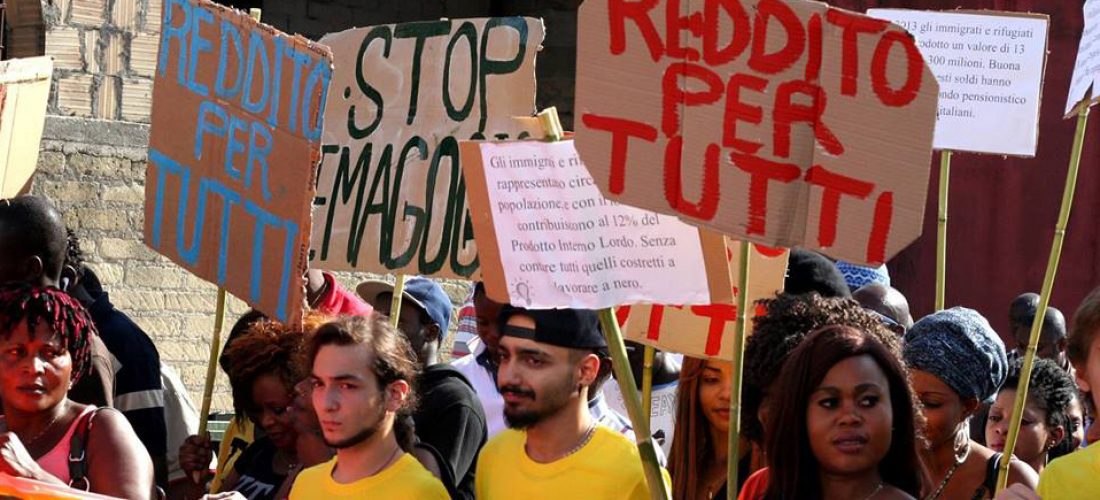Basic income began to be debated in Italy, even from different points of view, at least since about 4-5 years, when two law proposals were submitted to the Italian Parliament: one of the 5S Movement and the other as outcome of popular initiative with the support of more than 50,000 signatures (the necessary threshold according to the Italian Constitution) collected by a pool of political and civil society associations. The role of Bin-Italy, which took part to the juridical extension of the latter text and played a consulting role for the first, was particularly important. The two proposals have much in common (for example, that the financing burden falls on the collective taxation, that the provision should be individual and not familiar, that the beneficiaries should have, at least at the beginning, an income below the threshold of relative poverty) but also differences, especially as far as the degree of conditionality is concerned. For 5S movement the possibility to refuse a job offer is constraint to a maximum of three and there is an obligation to work a number of weekly hours in community services. For the law of petition (BIN-Italy law), it is introduced the concept of “fairness”, that is the possibility to reject any job offer, which is considered “unfair”, since it does not respect the following three parameters: 1. a salary level lower than the previous one (in the case of unemployed) or not in line with the contractual levels (in the case of youngs searching for their first job, without success); 2. a job, which is not in line with the qualifications and skills acquired; 3. a workplace that is more than 70 km far from the place of residence.
Currently, these laws were discussed in the appropriate Labour Committees of the House and Senate but have not yet been up to date for voting because the government chose other roads: actually in March, the new government has approved the introduction of Reis (Social Inclusion Income) which presents very different characteristics from basic income and cannot also be considered a minimum income according to the parameters of the EU (PE Resolutions 2009, 2010, Charter of rights, the 1992 Commission Recommendation). Reis is only paid to families that have a total taxable income of less than € 3,000 a year (a ridiculous amount), have a dependent or a disabled or at least two children and the breadwinner is unemployed over 55 years of age. Moreover, Reis includes an obligation to follow a path of integration to work, under penalty of revocation. The available financial resources amount to € 1.1 billion for 2017 and it is expected to increase to 1.6 in 2018. The result is that only ¼ of households in absolute poverty can be helped. It is an expense of 0.1% of national GDP in a country that already for social spending (net of the pension) spends less than half of the average of European countries. The expense to cope with the two proposals for a real minimum income is between 14 and 16 billion Euros, according to different official statistical sources
The current debate has given way to some experiment at local level. Among these, the City of Livorno is testing (for a period of only 6 months), the introduction of a form of income support. To this purpose it has been allocated 300 thousand Euros. Applications received by the Municipality were 997. Among the requirements is requested the residence in the municipality for at least five years, unemployment status, registration at the employment center and a family income not exceeding 6530 euro gross per year. In exchange for € 500 monthly, the municipality invited to perform socially useful work.
Some Italian regions such as Puglia, Friuli Venezia Giulia, Lombardy have anticipated the governmental model of income support for those in absolute poverty and dependent children or only for the long-term unemployed and often with the obligation to carry out community service: in any case not even remotely sufficient to restore decent living conditions. The governor of Apulia Mr. Emiliano spoke about the cleanliness of palm leaves on Bari seafront!
Conditionality acceptance to perform “community” work has been extended to unemployed and workers temporary outside production because of restructuring. Most minimum income experiments at local level are thus measures of workfare, if not poverty benefit (related to forms of slave labor) still tied to a purely assistance-concept, selective, on a strictly family-based, which have little to do with a ‘idea of basic minimum income which is however also instrument of freedom, personal self-determination. Further, they are not on line with the instruments already existing in more European country to fight social exclusion.
In conclusion, not only in Italy there is no testing of a basic income but even forms of guaranteed minimum income consistent with EU parameters. Finally it is generalizing a culture of coercive control on beneficiaries and induction to accept any kind of work. It is paradoxical in a country known to be free from the implementation of efficient active policies in the labor market and efficient employment services and training.
Last, but not least, in Italy we suffer of a cultural delay about the idea that basic income is mainly a primary income; that is, it is a mean of remuneration, and not only passive assistance, of all the lifetime that today is put to labor and to value but not yet certified as productive labor and, hence, paid. It is not a case that unpaid labor is sharply increasing.







